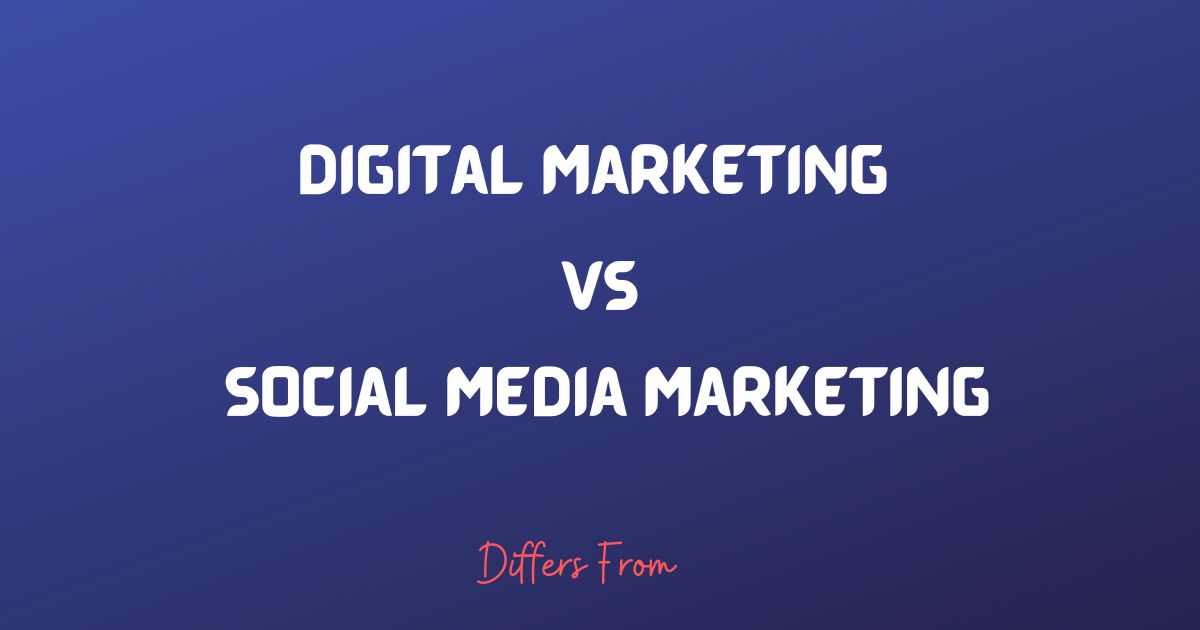Digital marketing encompasses various online channels and strategies, while social media marketing specifically focuses on social media platforms. Both are vital for modern businesses but differ in scope, channels, tactics, and objectives. In this article, we will discuss about the difference between digital marketing and social marketing in details:
Difference between Digital Marketing and Social Media Marketing:
| Digital Marketing | Social Media Marketing |
| The broad scope encompasses various online channels and strategies. | Subset of digital marketing, specifically focused on social media platforms. |
| Focuses on reaching and engaging target audiences digitally. | Utilizes platforms like Facebook, Twitter, Instagram, LinkedIn, YouTube, and TikTok. |
| Includes SEO, PPC advertising, email marketing, content marketing, display advertising, and affiliate marketing. | Strategies include content creation, paid social media advertising, influencer marketing, contests, and community engagement. |
| Goals: Generating leads, building brand awareness, increasing website traffic, and enhancing customer engagement, and retention. | Goals: Building a community of followers, increasing brand visibility and reach, driving website traffic and conversions, and enhancing customer satisfaction and loyalty. |
What is digital marketing?
Digital marketing is a broad term that uses various online channels and strategies to reach and engage target audiences.
It encompasses tactics such as search engine optimization (SEO), pay-per-click (PPC) advertising, email marketing, content marketing, display advertising, and affiliate marketing.
Digital marketing goals include generating leads, building brand awareness, increasing website traffic, and enhancing customer engagement and retention.
Digital Marketing
Digital marketing is a dynamic field that continues to evolve with technological advancements, consumer behavior, and platform updates.
It requires a strategic approach, constant monitoring, and adaptation to stay relevant and effectively reach and engage the target audience.
Search Engine Optimization (SEO)
SEO involves optimizing a website’s content, structure, and technical elements to improve its visibility in search engine results. It includes keyword research, on-page optimization, link building, and user experience enhancements.
Pay-Per-Click Advertising (PPC)
PPC advertising allows brands to display ads on search engines and other platforms and pay only when users click on their ads. Google Ads is a popular PPC platform offering keyword-targeted search ads and display ads on the Google Display Network.
Content Marketing
Content marketing focuses on creating and distributing valuable, relevant, consistent content to attract and retain a clearly defined audience. It includes blog posts, articles, videos, infographics, eBooks, podcasts, and more.
Email Marketing
Email marketing involves sending targeted messages to a subscriber list to promote products or services, deliver personalized content, nurture leads, and build customer relationships. Email marketing tools help manage subscriber lists, automate campaigns, and track performance.
Influencer Marketing
Influencer marketing leverages the influence of individuals with a large following on social media or other digital platforms. Brands collaborate with influencers to promote their products or services to engaged audiences.
Affiliate Marketing
Affiliate marketing is a performance-based marketing model where affiliates (publishers or influencers) earn a commission for driving conversions or sales to a brand. It can be an effective way to expand reach and increase sales.
Online PR and Reputation Management
Brands monitor their online reputation and manage public relations by monitoring mentions, addressing customer feedback, managing reviews, and responding to inquiries or complaints.
Marketing Analytics
Data analysis and tracking are essential in digital marketing to measure campaign performance, identify trends, make data-driven decisions, and optimize strategies. Tools like Google Analytics provide insights into website traffic, user behavior, and conversions.
Explore the contrasting approaches of digital marketing and social media marketing alongside traditional marketing and data-driven digital marketing to uncover the evolving landscape of effective advertising.
What is social media marketing?
Social media marketing is a subset of digital marketing that utilizes social media platforms to reach and engage with audiences.
It involves creating and sharing compelling content, running paid social media advertisements, leveraging influencer marketing, organizing contests, and managing community engagement.
The objectives of social media marketing include building a community of followers, increasing brand visibility and reach, driving website traffic and conversions, and fostering customer satisfaction and loyalty.
Types of Social media marketing
Social media marketing leverages online platforms to connect businesses with their target audience, foster brand awareness, drive website traffic, and enhance customer engagement. It offers a powerful and cost-effective.
Brand Awareness
Social media allows businesses to showcase their brand identity, values, and unique selling propositions through creative visuals, compelling content, and consistent messaging. It helps in increasing brand recognition and exposure among a wide audience.
Content Promotion
Social media platforms provide an ideal avenue to distribute and promote content such as blog articles, videos, infographics, and other valuable resources. This helps drive traffic to the brand’s website or blog, establish thought leadership, and position the brand as an industry authority.
Community Building
Social media enables the creation of a community around the brand. By actively engaging with followers, responding to comments and messages, and fostering conversations, businesses can build a loyal and engaged community that advocates for the brand and helps in amplifying its reach.
Customer Relationship Management
Social media provides a direct channel for businesses to interact with customers, address queries, resolve issues, and gather feedback. It allows personalized communication and enhances customer satisfaction, loyalty, and retention.
Influencer Partnerships
Social media platforms facilitate collaborations with influencers or brand ambassadors with a significant following and influence in a particular niche. Partnering with relevant influencers can help expand the brand’s reach, tapping into new audiences and generating buzz around products or services.
Social Advertising
Platforms like Facebook, Instagram, Twitter, and LinkedIn offer robust advertising options that allow businesses to target specific demographics, interests, and behaviors. Social media ads can promote products, drive website traffic, generate leads, and increase conversions.
Reputation Management
Social media is crucial in managing the brand’s online reputation. Monitoring social media mentions, addressing customer feedback, and handling negative comments or reviews promptly and professionally are essential to maintain a positive brand image.
Final Words
Digital marketing and social media marketing are two related but distinct concepts. Digital marketing refers to using digital channels and tactics to reach and engage target audiences.
It encompasses various online channels such as search engines, websites, email, and content marketing. On the other hand, social media marketing is a specific subset of digital marketing focusing exclusively on leveraging social media platforms.
It involves creating and sharing content, running ads, engaging with followers, and building a brand presence on platforms like Facebook, Instagram, Twitter, and LinkedIn.
While social media marketing is part of digital marketing, the latter is a broader term that encompasses a wider range of online marketing channels and strategies.

